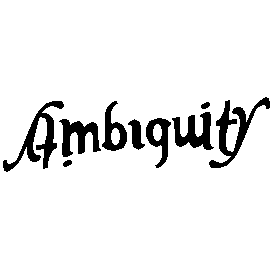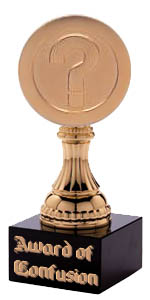Ambiguity
“I’ll tell you one thing, and then ... I'll tell you another.”
Ambiguity is a term, which can be considered in many ways. Some think of it in a certain fashion, while others think of it in a completely different fashion. Still, all the others, who consider it, consider it differently.
Ambiguity is not confusion. Those who are confused by ambiguity are very ambiguous. Ambiguity is something, but only in some sense, whilst in others, it can be considered differently, as it has various historical, categorical, contrarian, agrarian, librarian, social, linguistic, moralistic, religious, litigious, prestigious, prodigious, scientific, naturalistic, existential, espistemological, biological, deontological, geological, atavistic, deterministic, stochastic, elastic, anagocical, allegorical, metaphorical, pragmatic, semiotic, patriotic, memetic, dialectic, eclectic, dyslectic, hectic, apoplectic, abnormal, paranormal, semi-formal and other pretense; if not a combination of none or more of the above and beyond.
History of ambiguity
At some point in time, whilst people debated on its origins, anything had some property or other, while another did not. This led to many possible results, some of which may or may not have occurred. The properties themselves could not have led to certain results which may or may not have manifested themselves by the present time, which (temporally speaking) could be at any point between the occurrence of the event and the time at which a person reads these words, that may not have been written by someone (or something) in response to those events, whilst he claims it was. But the properties made the things look like they did, hence a reaction, and some kind of a reaction was, indeed, reported.
However, critics have pointed out that this is completely open to interpretation.
Disambiguation
- For other meanings of ambiguity, see Disambiguation.
Ambiguity differs from ambiguation in many important ways, as well as some unimportant ways. In some ways, however, it is exactly the same as ambiguation. That is why "disambiguation" ("not ambiguation") can be considered as a synonym to "ambiguity" only sometimes. One definition may hold that ambiguity is a proper noun that is often used as an adjective, whereas ambiguation is a improper or "transitive" noun that is often used as a transitive verb – for example, "the ambiguation of this article is highly ambiguous in its insistence on maintaining its own internal state of ambiguity." Others disagree with this hypothesis, insofar as it lacks any genuine coherency whatsoever.
Getting to the point
| “ | Ambiguity can save face the music box in innuendo and out the other. | ” |
Forget everything you have read up to this point. For the next point will be more or less convincing.
Getting to the point, in this context is, an important point to consider. Even Derek Point would consider that this as an example, is not as pointless as it seems to be. Here, Derek Point is not a man of an extreme significance for the main point of our discussion. But that is beside the point. That is why we should get back to the last full point and reconsider the issue.
So, what's the point? Right, ambiguity. So it seems that a reader of ours[1] got to the point after all. It should clear up a few misunderstandings around here.

References
- ↑ "Ours" can mean something completely different in a different context. Or may not, as even opposite things have points of resemblance. Getting back to the point, the use of a second persona pronoun in one of Uncyclopedia articles does not necessarily mean that Uncyclopedia is not an encyclopedia equivalent to a real encyclopedia. On the contrary, it does not necessarily mean anything at all. Consider French, for instance; in this language, "ours" means "bear" and is hardly a pronoun. But, yes, an English word "bear" can be a verb and a noun, so our reference here may not entirely help our reader. Just consider an idea that what was said above is applicable for anything that was said.
- ↑ Which set of instructions, is a well-defined (thus, not ambiguous) question that the reader can solve him/herself
How to best explain ambiguity
Here at Uncyclopedia, there are a lot of things. It is also common for answers to only come with a fair amount of searching. In order to best describe the kinds of things that Ambiguity might be all about, you might want to make researches. If by some strange coincidence you do not feel like doing so or maybe your Internet is not working properly. That is why below are the quotes most connected to "ambiguity".
“Accepting that the world is full of uncertainty and ambiguity does not and should not stop people from being pretty sure about a lot of things.”
“The goal is to live a full, productive life even with all that ambiguity. No matter what happens, whether the cancer never flares up again or whether you die, the important thing is that the days that you have had you will have lived.”
“Ambiguity depletes as your budget rises.”
Future of ambiguity
One thing is certain: Ambiguity will always be a part of human existence, though perhaps only a small part. However, it may become a very large part, assuming is isn't already. Indeed, the difficulty in ascertaining the likelihood of ambiguity's future success makes its future highly uncertain, which seemingly contradicts the certainty of ambiguity's role in human existence. Without question, further study is desperately needed.


